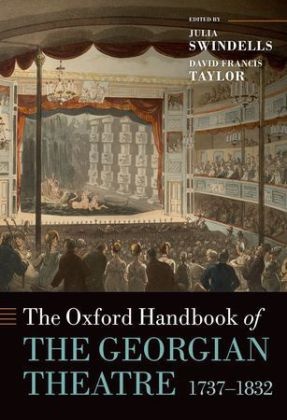Read more
The Oxford Handbook of the Georgian Theatre 1737-1832 provides an essential guide to theatre in Britain between the passing of the Stage Licensing Act in 1737 and the Reform Act of 1832 -- a period of drama long neglected but now receiving significant scholarly attention. Written by specialists from a range of disciplines, its forty essays both introduce students and scholars to the key texts and contexts of the Georgian theatre and also push the boundaries of the field, asking questions that will animate the study of drama in the eighteenth and early nineteenth centuries for years to come.
The Handbook gives equal attention to the range of dramatic forms -- not just tragedy and comedy, but the likes of melodrama and pantomime -- as they developed and overlapped across the period, and to the occasions, communities, and materialities of theatre production. It includes sections on historiography, the censorship and regulation of drama, theatre and the Romantic canon, women and the stage, and the performance of race and empire. In doing so, the Handbook shows the centrality of theatre to Georgian culture and politics, and paints a picture of a stage defined by generic fluidity and experimentation; by networks of performance that spread far beyond London; by professional women who played pivotal roles in every aspect of production; and by its complex mediation of contemporary attitudes of class, race, and gender.
List of contents
- Abbreviations and Conventions
- List of Figures
- List of Contributors
- Introduction
- Theatre, Theory, Historiography
- Enlightenment, Exclusion, and the Publics of the Georgian Theatre
- Theorizing Audience and Spectatorial Agency
- Theorizing the Performative Event
- Theatre Managers and the Managing of Theatre History
- Legislating Drama
- The 1737 Licensing Act and its Impact
- The Political Context of the 1737 Licensing Act
- The Dialectics of Print and Performance after 1737
- The 1832 Select Committee
- Looking Towards 1843 and the End of the Monopoly
- The Changing Cultures of Performance
- Georgian Theories of the Actor
- Theatrical Celebrity and the Commodification of the Actor
- Shakespeare in the Georgian Theatre
- Performing Variety, Packaging Difference
- Interrogating Legitimacy in Britain and America
- The Whole Show: Spectacles, Sounds, Spaces
- Painting the Scene
- Manufacturing Spectacle
- Orchestra and Theatre Music
- Dance and the Theatre
- Restoring a Georgian Playhouse
- Genres and Forms
- Genealogies of Comedy
- The Challenge of Tragedy
- Pantomimic Politics
- The Gothic Drama: Tragedy or Comedy?
- The Writing and Staging of Georgian Romantic Opera
- The Stages of Closet Drama
- The Formation of Melodrama
- Theatre and the Romantic Canon
- The Case of Byron's Marino Faliero
- Shelley, Viganò, and Coreodramma
- William Godwin and the Politics of Playgoing
- Jane Austen's Stage
- Women and the Stage
- Theorizing the Woman Performer
- Women Theatre Managers
- Women Playwrights
- Retrieving Elizabeth Inchbald
- Performing Race and Empire
- Empire, Sentiment, and Theatre
- Theatre, Islam, and the Question of Monarchy
- The Georgian Theatre in Colonial America
- Staging Atlantic Slavery
- Colman's Inkle and Yarico: four perspectives
- Historic Williamsburg: Theatre, Memory, and Colonial Slavery
- Index
About the author
Julia Swindells was a writer and teacher in Cambridge. She authored Glorious Causes: The Grand Theatre of Political Change, 1789-1833 (2001), and co-edited Pickering & Chatto's edition of eighteenth-century women's theatrical memoirs (2007-8). Her other books include Victorian Writing and Working Women (1985) and, as editor, The Uses of Autobiography (1995).
David Francis Taylor is Assistant Professor of English at the University of Toronto. He is the author of Theatres of Opposition: Empire, Revolution, and Richard Brinsley Sheridan (2012), as well as a number of articles on the political contexts of theatre in the Georgian period.
Summary
The Oxford Handbook of the Georgian Theatre 1737-1832 provides a comprehensive guide to theatre of the Georgian era across the range of dramatic forms.
Additional text
Beautifully illustrated, lucidly organized, and, above all, powerfully argued, The Oxford Handbook of Georgian Theatre 17371832 provides not only an authoritative reference guide, but a compelling read from cover to cover.
Report
exceptionally clear ... an indispensable teaching resource ... Showcasing the very latest research in this field in an accessible and detailed manner, and capturing all of the vibrancy and dynamism of the Georgian theatre, this Handbook will remain a vital resource for those teaching and researching Georgian culture for many years to come. David Kennerley, BARS Review

